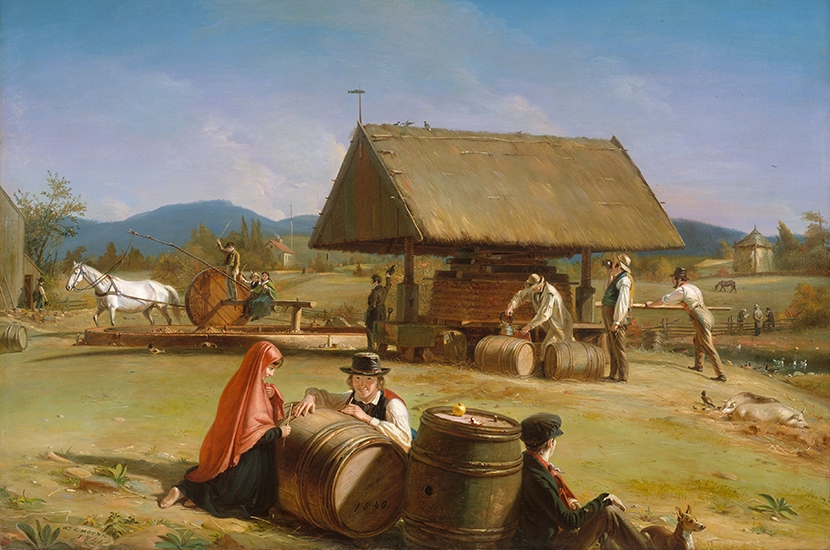Can you imagine if, in the 20th century, wine producers in France had switched from a product made (almost) entirely from grapes to something that was essentially grape-flavoured alcoholic sugar water? It’s inconceivable. In fact, they did just the opposite. To stamp out the growth of ersatz wines, the appellation contrôlée system was created, which, for all its faults, provides a guarantee that a particular wine will be made from grapes from a certain area.
But there was no such regulation in England. After the second world war, large-scale cider-makers in the West Country began lowering the amount of fruit in their products, specifically characterful bittersweet cider apples, and making up the rest with dessert apples and sugar. Quality plummeted. In his fascinating book Cider Country, James Crowden writes: ‘Bertram Bulmer once declared, in strict confidence, that you would not “catch him drinking any of his own products”.’
All this was done in the utmost secrecy. Crowden mentions a sinister conversation which Andrew Lea from the Long Ashton Research Station had with the technical director at Bulmers about changes to the company’s cider: ‘You must never mention these things to me again. Never talk about these things. These things are closed. They are secret. You must not tell anybody else what actually goes in cider.’ Blimey, it’s like something from the X Files.
The big cider-makers were applying a beer mentality to their products but, as Lea puts it, ‘cider works better when it is viewed as a wine’. The nadir came with the arrival of ‘white ciders’ in the 1980s, some of which were made from less than 7 per cent apples. ‘Cider has become little more than an alcopop,’ as Crowden puts it.
It’s a far cry from the drink’s 17th-century heyday, when gentlemen competed to produce wine-strength ciders. Some of the greatest minds were involved: ‘The Royal Society was, in effect, an upmarket cider club.’ These scientists were the first people to deliberately create sparkling drinks using the strong, dark glass bottles that were invented in England some time in the 1630s. Crowden has found new evidence in the letters of one cider enthusiast, John Beale, referring as early as 1657 to ‘mantling’ i.e. sparkling cider. At a time when claret was in short supply, cider was England’sanswer to wine.
All this from a fruit that was originally from Kazakhstan, where it still grows wild in forests. Cider Country is the story of how the Romans probably brought the apple to Britain, where it crossed with native crab apples to produce the wondrous variety that we have today. It’s fitting that Crowden is a poet as well as a cider enthusiast, as there’s music in the names — Dashayes Crab, Sweet Sheep’s Nose, Slack-ma-Girdle, Golly Knapp, Puddletown, Meadyyate and Hewbramble.
But many other apples have been lost. After the 1960s, countless orchards fell into disrepair or were destroyed. The cider research station at Long Ashton was privatised and eventually closed in 2003. Somerset kept its tradition of small- and medium-scale cider-making, but it virtually died out in Devon, and apple varieties disappeared or their names were forgotten.
Crowden knows this world intimately, having worked nearly 20 harvests at Burrow Hill in Somerset with Julian Temperley. He has a gift for evoking the rhythms and smells of cider-making, something he has charted in two previous books: Cider: The Forgotten Miracle (1999) and Ciderland (2008). His discursive style is as evident as ever in this new one, though at times he does go on a bit: the chapter on the apple in mythology could have done with pruning.
But a Crowden book shouldn’t get to the point immediately; it should be a conversation in the pub or under a tree with a glass of finest Somerset Redstreak, not a Magners on ice. Crazily, both drinks are classed simply as cider, though most commercial products are made from 30-50 per cent apple concentrate, which could be imported from China. Crowden writes: ‘Changing labelling rules is perhaps a vital step forward, so the cider drinker knows far more about their cider.’
The big players have a vested interest in this not happening; but happily there’s a quiet renaissance going on, as a new generation of cider-makers are reconnecting with their heritage. This spirit is epitomised by Find & Foster — husband and wife Mat and Polly Hilton — who revitalise old orchards in Devon. Try one of their ciders, or something from Tom Oliver in Herefordshire or Starvecrow in Sussex, and you’ll see there’s never been a better time to rediscover England’s ancient wine.






Comments